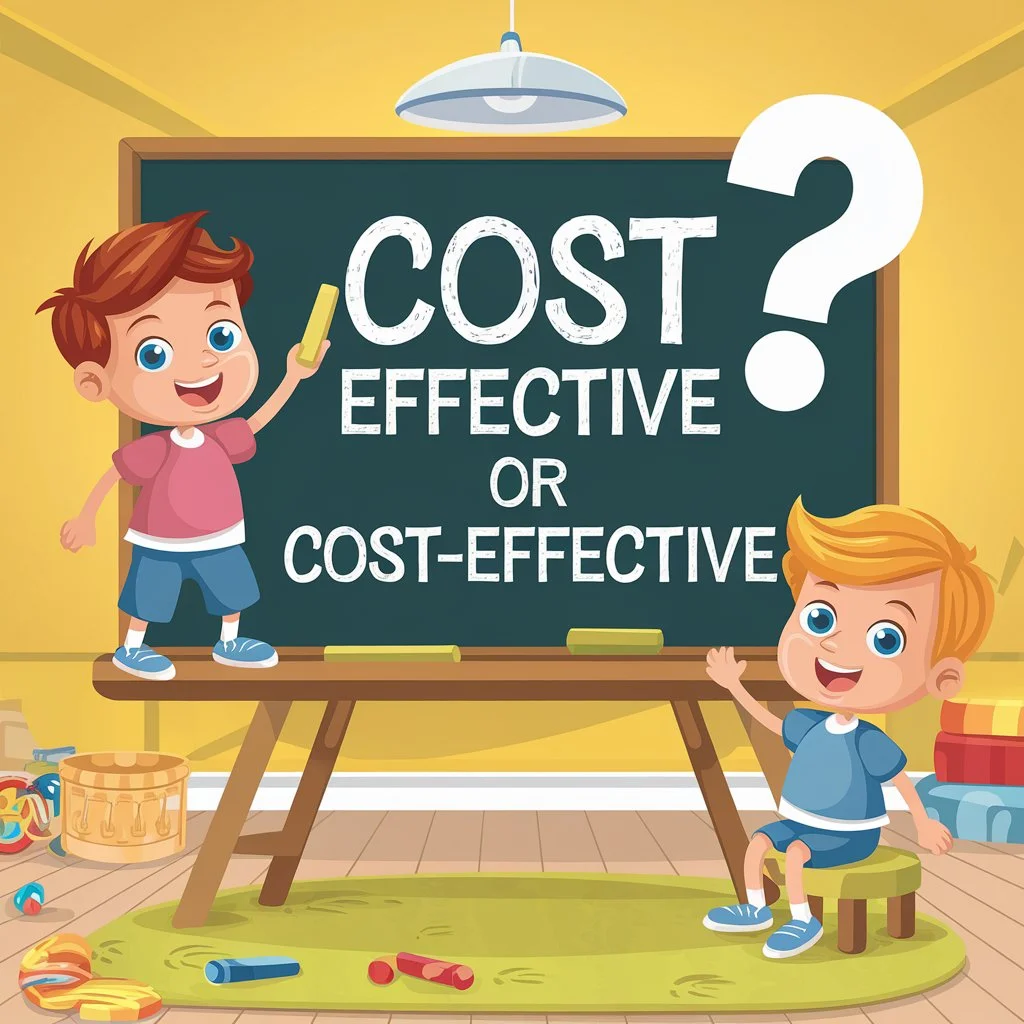Understanding when to use hyphens can be challenging, especially with a plethora of rules in the English language. One term that often raises questions is “cost-effective.” Let’s delve into the nuances of whether to hyphenate it. In the realm of English grammar, the use of hyphens can often be perplexing, especially when it comes to compound terms like “cost-effective.”
Understanding when to hyphenate can significantly impact clarity and professionalism in your writing. Whether you’re crafting a report, an article, or simply trying to communicate effectively, knowing the correct form is essential. This guide will clarify the distinctions between “cost effective” and “cost-effective,” offering insights into their appropriate usage. By mastering this small but crucial detail, you can enhance your written communication and convey your ideas with confidence.
Cost Effective or Cost-Effective: Which Is Correct?
The term “cost effective” is typically employed as a standalone noun. In contrast, “cost-effective” is used to modify a noun, functioning as an adjective when hyphenated. Once you grasp the basic principles, distinguishing between the two becomes straightforward.
- The new software is very cost-effective for small businesses.
- They implemented a cost-effective strategy to reduce expenses.
- Choosing a cost-effective option saved the company a lot of money.
- Is this solution truly the most cost-effective one available?
- Her analysis showed that the project was not cost effective in the long run.
- We need a cost-effective way to improve our marketing efforts.
- The research team found that the method was more cost effective than anticipated.
- The consultant recommended several cost-effective alternatives.
- Investing in training is a cost-effective approach to enhance employee skills.
- The cost-effective model has proven successful in multiple industries.
Is Cost Effective Hyphenated in AP Style?
If you’re wondering about the hyphenation rules according to AP Style, here’s a brief explanation. According to AP guidelines, hyphens serve as “joiners” that combine two closely linked words to form an adjective that modifies a noun in a sentence. “Cost-effective” fits perfectly within this definition.
Should I Capitalize “Effective” in “Cost-Effective”?
When it comes to writing “cost-effective” in a title, capitalization can be confusing. Some writers hesitate to capitalize the second word in a hyphenated phrase, feeling it might be incorrect. Here’s a clear approach: your title’s style is largely a matter of personal preference.
- Option One: Capitalize the first letter of the first word and any proper nouns, while keeping the rest of the title in lowercase. In this case, “effective” would remain lowercase.
- Option Two: Capitalize most words in the title but leave out short prepositions, conjunctions, and articles. Here, you would capitalize “cost” but not “effective.”
Alternatively, some prefer to capitalize every word in a title. If this is your style, you would capitalize both words in “cost-effective.”
Examples of Using “Cost Effective”
Although “cost effective” is less common, it is used when it stands alone. Here are some examples:
- Jimmy took the approach that was the most cost effective.
- Michael’s solution to the problem was incredibly cost effective.
- Buying the unlocked phone outright is more cost effective.
- The new plan is a cost effective way to meet our budget goals.
- After reviewing the options, we determined that this solution was the most cost effective.
- Switching to energy-efficient appliances is a cost effective strategy for reducing utility bills.
- The committee agreed that the cost effective approach would yield the best results.
- His analysis confirmed that the project would be cost effective over the next few years.
- They are looking for cost effective methods to improve their production processes.
- We found that the cost effective alternative provided similar quality at a lower price.
- Implementing remote work policies can be a cost effective solution for many companies.
- The manager emphasized that a cost effective approach is crucial for sustainability.
- By using digital marketing, the startup discovered a cost effective way to reach its audience.
Even though many people choose to hyphenate, knowing the correct context for using the non-hyphenated form can be helpful. If you’re ever uncertain, it’s safer to use the hyphen in “cost-effective.”
Examples of Using “Cost-Effective”
Now, let’s transform the previous examples to demonstrate the hyphenated form:
- Jimmy took the cost-effective approach.
- Michael’s incredibly cost-effective solution solved the problem.
- The more cost-effective option is to buy the unlocked phone outright.
- The company adopted a cost-effective strategy to increase productivity.
- Their cost-effective solution helped reduce expenses significantly.
- We need to evaluate which options are cost-effective for our budget.
- The new advertising campaign proved to be highly cost-effective.
- Implementing these changes was a cost-effective way to enhance customer satisfaction.
- The team researched several cost-effective methods for project management.
- This software provides a cost-effective alternative to more expensive programs.
- The cost-effective design won several awards for innovation.
- They found that the cost-effective approach resulted in higher profits.
- Using public transportation can be a cost-effective choice for commuting.
Alternatives to “Cost Effective”
If you’re looking for other ways to express “cost-effective,” consider these alternatives:
- Economical: A formal term indicating a money-saving option.
- Low-cost: Another hyphenated term signifying affordability.
- Thrifty: A more informal option, typically not used in professional settings.
- Money-saving: A straightforward term that clearly communicates the idea.
Quiz: Cost Effective or Cost-Effective?
Now, let’s put your knowledge to the test! Choose between (A) cost-effective or (B) cost effective in the following sentences:
- He came up with the most (A. cost-effective / B. cost effective) solution.
- She wasn’t sure which option would be more (A. cost-effective / B. cost effective).
- Jimmy took the most (A. cost-effective / B. cost effective) approach.
- She came up with a perfect solution that was (A. cost-effective / B. cost effective).
- Buying the three-year warranty is more (A. cost-effective / B. cost effective).
Quiz Answers
- A
- B
- A
- B
- B
With these guidelines in mind, you should feel more confident using “cost-effective” correctly in your writing!
FAQs
What is the difference between “cost effective” and “cost-effective”?
The primary difference lies in their usage. “Cost effective” is typically used as a standalone adjective, while “cost-effective” is a compound adjective that modifies a noun. For example, you would say, “The solution is cost effective” without a hyphen, but “We found a cost-effective solution” requires the hyphen. Understanding this distinction is crucial for clear communication. In summary, always use the hyphen when the phrase modifies a noun.
When should I use a hyphen in compound adjectives?
Hyphens are often used in compound adjectives when they precede the noun they modify. For example, phrases like “high-quality” or “state-of-the-art” need hyphens to clarify that the words work together to describe the noun. However, if the compound adjective follows the noun, hyphens are typically not necessary. So, you would say, “The project was successful and cost effective,” but “It was a cost-effective project.” This consistency helps maintain clarity in your writing.
How does AP Style treat hyphenation?
According to AP Style, hyphens are considered “joiners” that link two closely related words to form a single adjective. In this case, “cost-effective” is hyphenated because it acts as a compound modifier before a noun. AP Style encourages clarity and conciseness, making hyphenation a useful tool in professional writing. If in doubt, following AP guidelines will help ensure that your writing meets industry standards. Adhering to these rules can enhance the professionalism of your work.
Can I use “cost effective” in a formal setting?
While “cost effective” can be used in formal writing, it is often recommended to use the hyphenated form, “cost-effective,” for clarity. The hyphenated version emphasizes the compound nature of the term, making it clear that it describes a single quality of the noun. In formal contexts, precision in language is vital, so opting for “cost-effective” is usually safer. Ultimately, using the correct form can reflect your attention to detail in professional communication. This can enhance your credibility as a writer.
What are some alternatives to “cost-effective”?
If you’re looking for synonyms, consider using words like “economical,” “low-cost,” or “money-saving.” Each alternative has its nuances: “economical” conveys a sense of smart financial decision-making, while “low-cost” emphasizes affordability. “Thrifty” is more informal but can convey the idea of being resourceful. Choosing the right synonym depends on the context and the tone you wish to convey. Utilizing these alternatives can diversify your vocabulary and enhance your writing.
How can I remember when to use hyphens?
One effective way to remember is to consider whether the terms work together to modify a noun. If they do, a hyphen is typically necessary. You can also create a mental checklist: if the phrase is used before a noun, hyphenate; if it follows the noun, you can likely drop the hyphen. Practice makes perfect, so try incorporating these rules in your writing. Over time, you’ll find it becomes more intuitive.
Conclusion
Mastering the use of hyphens in terms like “cost-effective” can significantly enhance your writing clarity and professionalism. By understanding the distinctions and following established guidelines, you can communicate your ideas more effectively. Remember, the goal of writing is not just to convey information but to do so in a way that is clear and engaging. As the famous writer William Strunk Jr. said, “Writing is an act of communication.” By honing your skills, you can ensure your message is received loud and clear.

I’m Clara Whitmore, the girl running the show at “Grammer Grove.” I’ve been playing with expressions and formats to make grammer a whole lot of fun. Over at Grammer grove, we’re here to make your English grammer incredible. Let’s add some professionalism and gratitude to yourwritting together!












